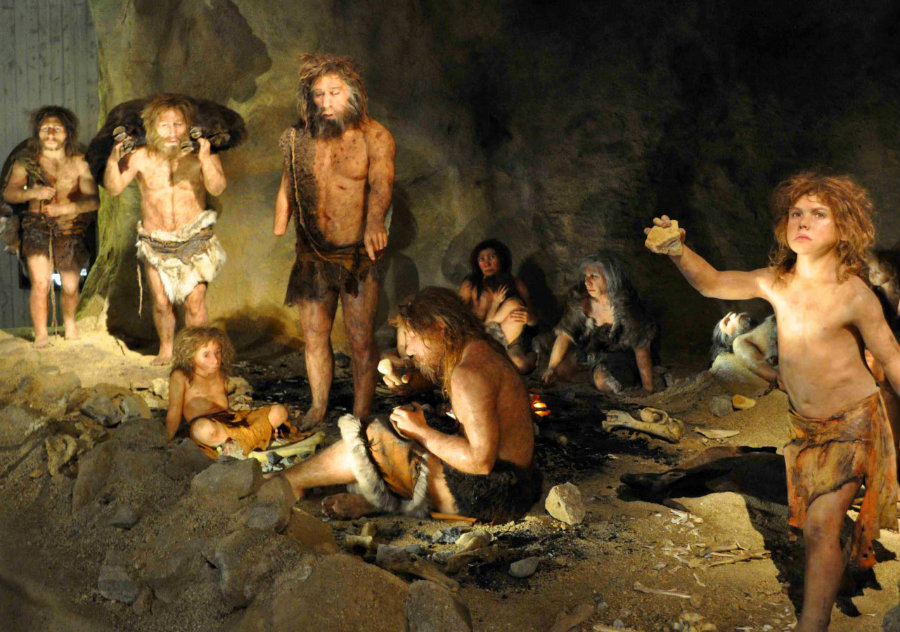The current thinking in human evolution is that fully modern humans migrated from Africa somewhere between 50-100,000 years ago. As the crisis of consciousness intensifies, one is compelled to ask: Is a new human being possible?
 I’m not speaking metaphorically, but referring to the awakening of a latent potential in the individual that allows a transmutation, and the emergence of a new human species.
I’m not speaking metaphorically, but referring to the awakening of a latent potential in the individual that allows a transmutation, and the emergence of a new human species.
In the not so distant past (evolutionarily speaking), two or more different species of humans existed at the same time. We all know about the Neanderthals in Europe, a sub-species of Homo sapiens that pre-dated modern Homo sapiens by perhaps hundreds of thousands of years.
But there have been others, such as the Denisovans from Siberia, a distinct branch that seems to have interbred with a later wave of humans.
The only thing paleo-anthropologists are certain of is that there has been only been one species of humans for tens of thousands of years. Everyone alive is descended from a common stock, which originally numbered only in the thousands.
That’s an astounding thing to contemplate. Human numbers have grown to 7.4 billion from as few as five thousand people, after a ‘bottleneck’ occurred when the proto-human species that gave rise to us was nearly wiped out.
Though the people tens of thousands of years ago weren’t conscious of it, the pressure this bottleneck created drove a cognitive leap in human evolution, one that gave us our capacity for diverse languages and cultures, art, sophisticated technology, as well as modern science. Can there be another leap—conscious and non-cognitive—awakening our latent capacity for insight and understanding?
The human species facing another kind of bottleneck, an ecological one produced and signified not by a precipitous drop of numbers, but an explosion of population and the misuse of symbolic thought. Our survival is threatened by the unwise application of the very adaptive pattern that made us so successful as a species—too successful for the earth and for our own good.
Evolution has no goal, but it seems to have an intrinsic intent—to develop, through directional randomness, increasing complexity in all systems, from stars and galaxies to brains such as ours, capable of communion with Mind.
If so, all that precedes brains like ours is scaffolding on which we precariously stand. If so, man (the creature that separates and manipulates, generating increasing fragmentation out of a lack of self-knowing) is not a mistake but a stage of evolution.
What then is the next stage, and how do we awaken it in ourselves?
Science and technology cannot lead the next phase of human evolution. However rationally applied, they are instruments of thought, and the domination of thought in the brain is precisely what has to radically change.
Therefore genetic or technological manipulation, much less merging with our machines to become computer-driven cyborgs, can only make human alienation and destructiveness worse.
Psychological thought/time is the great enemy of human realization. But if conscious evolution is impossible because it means employing time, isn’t the conscious intent for the emergence of a new human being a contradiction?
Intent is one thing, and a goal is another. A goal implies an idea and an end, involving desire, ideal, planning and time. What we call evolution is actually a projection of psychological time.
On the other hand, intent implies only direction and drive. Realization is a never-ending process of growth and unfolding. Isn’t the universe itself in the state of both being and becoming?
The world we have made (we being the living generations and all the generations that have preceded us) has become a crucible for radical change, indeed transmutation.
So what brings about a transmutation within oneself, the individual, where it can only begin? And just what does transmutation mean?
I feel transmutation means effectively ending of psychological thought and time as the ruling principle and paradigm of our lives.
Without method, technique or tradition, the attentive mind quiets and insight fully awakens. However briefly, one ceases being a psychological creature, and personal, family and racial history no longer have purchase.
During meditation, one leaves the stream of memory, association and time. Apparently few people ever consciously experience such a state.
But if it’s so rare, and even one who regularly leaves the stream of content-consciousness reverts to it, is it possible for average people to bring about such a radical change within themselves?
It must be. Incrementalism is the path to hell, and extinction. The next leap of evolution is neither a function of science and knowledge, or technology and time, but of direct perception and insight.
“One instant is eternity;
eternity is the now.
When you see through this one instant,
you see through the one who sees.”
Wu-men (1183-1260)

